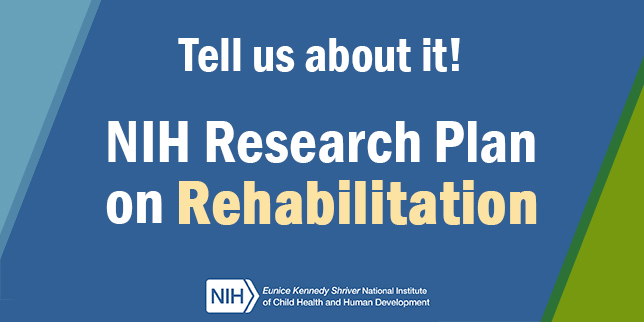Through basic, translational, and clinical research, NCMRR aims to foster development of scientific knowledge needed to enhance the health, productivity, independence, and quality of life of people with physical disabilities.
NCMRR supports research on the following topics: pathophysiology and management of chronically injured nervous and musculoskeletal systems (including stroke, traumatic brain injury, spinal cord injury, and orthopedic conditions); repair and recovery of motor and cognitive function; functional plasticity, adaptation, and windows of opportunity for rehabilitative interventions; rehabilitative strategies involving pharmaceutical, stimulation, neuroengineering approaches, exercise, motor training, and behavioral modifications; pediatric rehabilitation; secondary conditions associated with chronic disabilities; improved diagnosis, assessment, and outcome measures; and development of orthotics, prosthetics, and other assistive technologies and devices.
The center's National Advisory Board on Medical Rehabilitation Research meets twice a year to discuss NCMRR's portfolio and research directions. Parts of the meetings are open to the public and minutes and other related information are available.
NCMRR also led the development of the NIH Research Plan on Rehabilitation (PDF 443 KB) for the conduct, support, and coordination of medical rehabilitation research across NIH.
To receive email updates from NCMRR, including funding opportunities, notices, meetings, and job opportunities, subscribe to the NCMRR Rehabilitation Research newsletter.

Partners
Learn about the organizations and other agencies that NCMRR works with to advance research and care.

Comment on the NIH Research Plan on Rehabilitation 
NIH invites valued stakeholders to share comments and ideas on the revised research plan through the NICHD IdeaScale Community.
Highlights
- Read a summary of responses (PDF 178 KB) to NOT-HD-20-033: Request for Information (RFI): Response to Proposed NIH Rehabilitation Research Plan Objectives. Stakeholders in the field of rehabilitation research offered input on the draft research themes and objectives for the NIH Research Plan on Rehabilitation (PDF 443 KB).
- Read the summary (PDF 865 KB) of the Rehabilitation Research 2020: Envisioning a Functional Future conference, which NCMRR co-sponsored on October 15-16, 2020.
- Read a summary of responses (PDF 187 KB) to NOT-HD-20-004: Request for Information (RFI): Seeking Rapid Advancement of Research on Limb Regeneration, led by NCMRR. Stakeholders with knowledge of limb regeneration research offered insight into the current state of the science and its potential for rapid advancement.
- We asked and you replied! Read the summary of responses (PDF 113 KB) received from stakeholders involved in medical rehabilitation research regarding their perception of progress on priorities set in the 2016 Research Plan on Rehabilitation.
- NCMRR grantee Dr. Sook-Lei Lew, from the University of Southern California, is featured in a new video for the series Fast Forward Girls, which encourages girls to learn more about science, technology, engineering, and math fields. (Look for her around 05:05)
- Dr. Alison Cernich hosted a livestream with NCMRR grantee Dr. Peter Pidcoe for a special Take Your Child to Work Day event. Dr. Pidcoe discusses with participants a device he helped design that gives babies at risk for cerebral palsy a robotic boost to crawl.
- Dr. Cernich hosted a livestream with NCMRR grantee Dr. Michael Boninger at NIH's SCI2020 meeting on spinal cord injury research. Learn about his thought-controlled robotic glove and other types of brain-computer interface devices that can help those with motor impairments.
- NCMRR-Related NICHD News
- Learn more about NICHD's Small Business Research Programs
 BACK TO TOP
BACK TO TOP